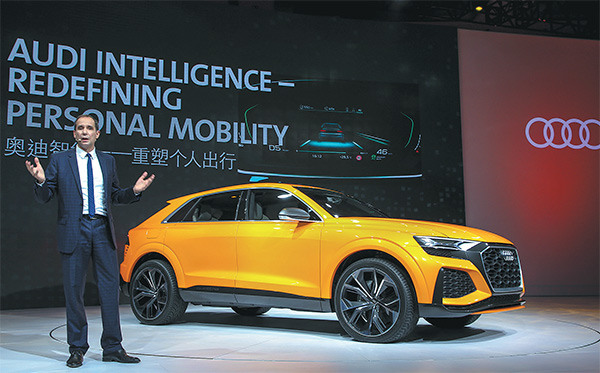
Audi China chief Joachim Wedler presents the Q8 concept at a news conference ahead of the Guangzhou auto show.(Photo provided to China Daily)
Debuted lineups at ongoing car show identify most popular segments
If there is anything that carmakers have in common in a market as fast-changing as China's, it is their conviction in the prospects for SUVs and electric cars, or even better still, electric SUVs.
At the ongoing Guangzhou auto show in Guangdong province, out of the 47 models that are making their debuts, 28 are SUVs.
New energy vehicles, including electric cars, total 131, some 12 percent of the total exhibits at the year-end gala.
It is no wonder. China saw 7.98 million SUVs sold in the first 10 months this year, about 41 percent of total passenger car sales, and SUVs have been the sole growing segment, according to the China Association of Automobile Manufacturers.
"How quickly SUV demand in China is developing, I confess, is a little bit surprising to us, but we are now on the way," said Jochem Heizmann, head of Volkswagen Group China.
The Volkswagen brand, with its Tiguan already well sought after in the market, is planning to introduce at least 10 such models in the country by 2020.
Heizmann said the first model from its third joint venture, JAC Volkswagen, will also be an electric SUV.
Czech carmaker Skoda, a brand under Volkswagen AG, has unveiled its compact SUV Karoq at the auto show, which its China head Ralf Hanschen expects to further push the success story that its Kodiaq started.
China's SUV craze has not only taken aback Heizmann, but also Alan Batey, head of Chevrolet.
"We have not been fast enough to introduce a full SUV lineup, so 30 percent of our future products to be SUVs," Batey told China Daily on Friday. "We clearly have a big opportunity with SUVs."
Those who have already seized the opportunity, like Audi, are speeding up to introduce yet more models.
Audi presented its Q8 concept on Thursday in Guangzhou, where its China head Joachim Wedler said the premium brand will launch six brand-new SUVs in China, including the Q8. Two of them are pure electric models.
The company has been localizing its Q5 and Q3 in China, some of the best-selling models in their respective segments.
Lincoln, which is the fastest-growing premium carmaker in China, has introduced all its SUVs into China, with the new full-sized Navigator unveiled on Friday as the latest addition.
Amy Marentic, president of Lincoln Asia Pacific, expects SUVs' popularity to continue for another five to 10 years, with the segment's market share rising even higher.
"I believe it will be somewhere between 55 percent to 60 (in 10 years)," said Marentic.
Models from volume brands are even more welcome.
Lynk & Co, which unveiled its 01 SUV at the Guangzhou auto show, sold 6,000 vehicles in less than one hour.
Great Wall Motor's Wey, unveiled at last year's Guangzhou auto show, has proved to be a success story as the SUV producer's attempt to go up in the market. It came back this year with more SUV models. Borgward, one of the latest brands to hit China's market, has launched its 2018 version BX5, which is available in seven variants.
Electrification drive
Carmakers are starting to put greater emphasis on new energy cars, believing that China will take the lead worldwide.
BMW is taking that one step further with the world premiere of the all-new BMW 5 Series plug-in hybrid in Guangzhou on Friday, produced by its Chinese venture BMW Brilliance in Shenyang, Liaoning province.
With the introduction of this car, the German brand will offer 6 new energy models. Following the BMW i3 and i8, BMW's electrification technology is extended to its core models, including the X1, X5 and the 7 Series plug-in-hybrid. Next year, Japanese premium brand Lexus will bring in two flagship models, the all-new Lexus LS and LC coupe, with only hybrid powertrain provided for Chinese customers who willingly contribute to the environment.
Besides these two automakers, more international auto giants are now frequently employing hybrid powertrains with or without a charging plug, as they believe hybrid is a realistic solution towards an electrified future. They are convinced that hybrid powertrains are slashing emissions of carbon dioxide and pollutants, by cutting the average fuel consumption to one-digit liters per 100 kilometers.
However, their Chinese peers are taking one step further to roll out fully electric products. They found it could be a critical opportunity to overtake the traditional giants, according to the experts gathered at the Global Future Mobility Forum in Hangzhou, Zhejiang province, days ahead of the auto show.
Chen Quanshi, a professor in automobile engineering at Tsinghua University, said the Chinese manufacturers of power batteries and electric motors are taking the lead, while European auto giants are maintaining their slow paces.
He said at the forum: "Electrification is what is happening today. The country has the diligence to strengthen the e-vehicle industry, so the automotive companies will have to transition swiftly in the right direction." The Chinese auto manufacturing industry and carmakers have to open themselves up to embrace power and technologies from outside, to utilize each other's competitive advantages and to push forward development with an integrated approach, according to Zhang Yongwei, an official at the Development Research Center of the State Council.
Chen Qingtai, an automobile expert with the center, said a brighter electrification future would be forged via the joining of information technology companies including Alibaba Inc and Baidu Inc. "We have strong advantages in both batteries and internet connectivity. If we seize the opportunities, the Chinese industry will be the future winner."


















































